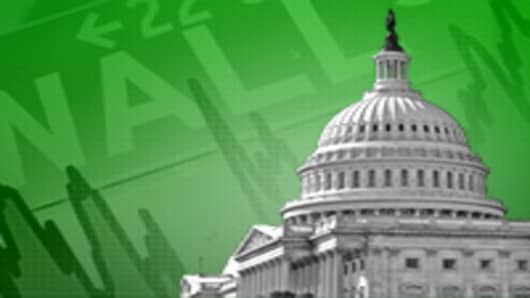Those trying to follow the last-minute legislative maneuvering around the massive financial services reform bill about to be voted on in the House might benefit from a scorecard. (Check here from time to time for updates.)
Not only is the House's "Wall Street Reform and Consumer Protection Act of 2009", HR 4173, 1300-pages long, containing ten key--and complicated--components, it generated some 200 amendments. About forty will make it to the floor for consideration amendments. Only half, however, will get as far as a vote.
Here's a summary of the bill's ten main provisions, provided by the House Financial Services Committee, as it completes consideration of amendments today.
Consumer Protections: Createsthe Consumer Financial Protection Agency (CFPA), a new, independent federal agency solely devoted to protecting Americans from unfair and abusive financial products and services.
Financial Stability Council: Creates an inter-agency oversight council that will identify and regulate financial firms that are so large, interconnected, or risky that their collapse would put the entire financial system at risk. These systemically risky firms will be subject to heightened oversight, standards, and regulation.
Dissolution Authority and Ending “Too Big to Fail”: Establishes an orderly process for dismantling large, failing financial institutions like AIG or Lehman Brothers in a way that ends bailouts, protects taxpayers, and prevents contagion to the rest of the financial system.
Executive Compensation: Gives shareholders a “say on pay” – an advisory vote on pay practices including executive compensation and golden parachutes. It also enables regulators to ban inappropriate or imprudently risky compensation practices, and it requires financial firms to disclose any compensation structures that include incentive-based elements.
Investor Protections: Strengthens the SEC’s powers so that it can better protect investors and regulate the nation’s securities markets. It responds to the failures to detect the Madoff and Stanford Financial frauds by ordering a study of the entire securities industry that will identify needed reforms and force the SEC and other entities to further improve investor protection.
Regulation of Derivatives: Regulates, for the first time ever, the over-the-counter (OTC) derivatives marketplace. Under the bill, all standardized swap transactions between dealers and “major swap participants” would have to be cleared and traded on an exchange or electronic platform. The bill defines a major swap participant as anyone that maintains a substantial net position in swaps, exclusive of hedging for commercial risk, or whose positions create such significant exposure to others that it requires monitoring.
Mortgage Reform and Anti-Predatory Lending: Would incorporate the tough mortgage reform and anti-predatory lending bill the House passed earlier this year. The legislationoutlaws many of the egregious industry practices that marked the subprime lending boom, and it would ensure that mortgage lenders make loans that benefit the consumer. It would establish a simple standard for all home loans: institutions must ensure that borrowers can repay the loans they are sold.
Reform of Credit Rating Agencies: Addresses the role that credit rating agencies played in the economic crisis, and takes strong steps to reduce conflicts of interest, reduce market reliance on credit rating agencies, and impose a liability standard on the agencies.
Hedge Fund, Private Equity and Private Pools of Capital Registration: Fills a regulatory hole that allows hedge funds and their advisors to escape any and all regulation. This bill requires almost all advisers to private pools of capital to register with the SEC, and they will be subject to systemic risk regulation by the Financial Stability regulator.
Office of Insurance: Creates a Federal Insurance Office that will monitor all aspects of the insurance industry, including identifying issues or gaps in the regulation of insurers that could contribute to a systemic crisis and undermine the entire financial system.
For those of you looking to drill down a bit deeper, here's a summary of votes on key amendments Thursday and Friday.
For complete details on all 40 of the amendments go to the House Rules Committee site. (All descriptions here are from the committee site.)
Frank Manager’s Amendment (Passed: 240-182)
Of all of the above, the Manager's Amendment--offered by the House Financial Services Chairman Barney Frank (D-Mass.), a key sponsor of the bill, is the most important. It makes dozens of changes to the original legislation, too numerous to summarize here.
Kanjorski/Frank/Sarbanes/Cohen Amendment #51 (Defeated 153-271)
"Would strike the provisions exempting public companies with less than $75 million in market capitalization from the requirements of the Sarbanes-Oxley Act related to the external audit of internal controls.'
Conyers/Turner/Lofgren/Marshall/Waters/Cohen/Miller (NC)/ Delahunt/Nadler/Fudge Amendment #201 (Defeated 241-188)
Revised: Would allow bankruptcy courts to extend repayment periods, reduce excessive interest rates and fees, and adjust the principal balance of the mortgage to a home's fair market value as necessary to prevent foreclosure and revised to allow the VA, FHA, and RHS to take steps to facilitate mortgage modifications. The amendment is substantively identical to title I, subtitle A and sections 121-123 of subtitle B of H.R. 1106 Helping Families Save Their Homes Act of 2009), which passed the House on March 5, 2009. (See related story)



